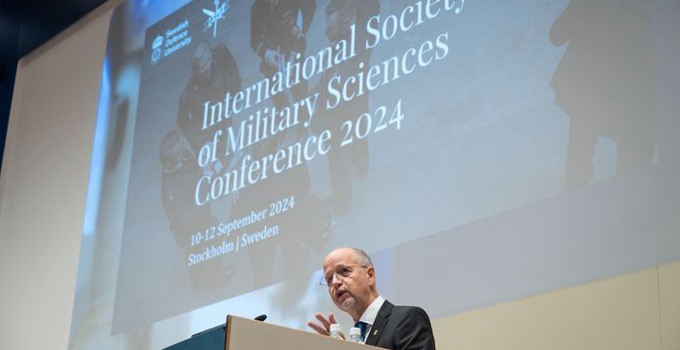
Kjell Engelbrekt, dean and professor of political science at the Swedish Defence University and chairman of ISMS. Photo: Anders G Warne.
The Swedish Defence University hosts international defence conference
The war in Ukraine, the management of hybrid threats, and the impact of AI on the defence domain were some of the themes at this year's edition of the International Society of Military Sciences Conference, organized by the SEDU.
Participants from nearly 50 countries gathered at the Swedish Defence University for the annual conference organized by the International Society of Military Sciences, ISMS. The responsibility for arranging the event rotates with the presidency, and this year it was Sweden and the Swedish Defence University's turn.
Over two and a half days, new research was presented in various configurations. "Scaling Up, Learning Lessons, Ensuring Quality" was the theme for this year's conference, with several seminars addressing lessons and strategies from Russia's ongoing offensive war against Ukraine.
One of the participants was Suzana Lampreia, an officer in the Portuguese Navy and a researcher at the Portuguese Naval Academy, who also gave a presentation on logistics and dynamic maintenance. The conference is important as Europe is at war, she believed.
"We in friendly countries need to share our perspectives among ourselves. We must not forget our history, even if we have done so a bit. Some believe they will always have peace."
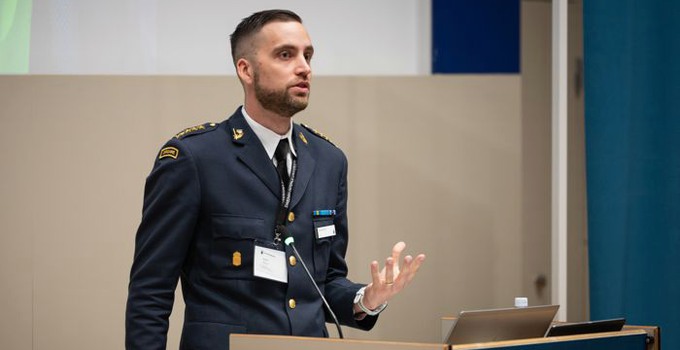
Daniel Smith. Photo: Anders G Warne.
Hybrid threats and disinformation
Viktor Savchenko, Deputy Chief of Staff of the 30th Marine Infantry Corps of the Ukraine's Armed Forces,
discussed how Russia utilizes a variety of hybrid threats to achieve its military and political objectives. Examples include disinformation, allegations of corruption, and supporting conflicts in neighboring areas. International cooperation is one of several ways to counter the effects of hybrid threats, according to Viktor Savchenko. He also highlighted how Ukraine's tactics are evolving due to technological advancements.
"Now, many robotic systems are used at the front lines, while we see fewer and fewer people. The same situation applies to the enemy. It's difficult to survive when you gather more than five people in one place. They become targets for weapons. There could be many drones at the same time," said Viktor Savchenko during a subsequent panel discussion.
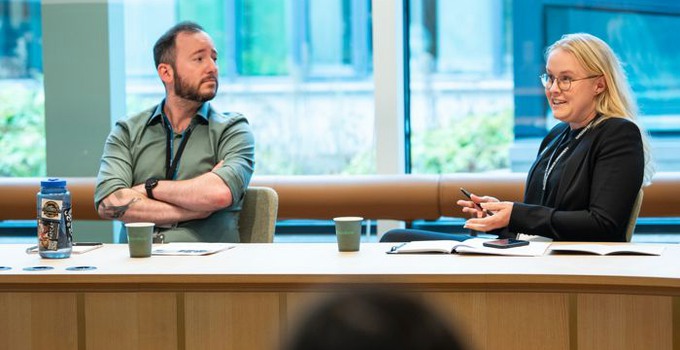
AI needs a breakthrough
The conference concluded with Antoine Bousquet, Associate Professor and Senior Lecturer in Political Science at the Swedish Defence University, reviewing how AI is expected to contribute to the defence and security sector in the future. After several years of intense development, the hype seems to be waning, according to Antoine Bousquet.
"Now, some investors are becoming restless. Everyone is playing around with Chat GPT and language models, but they haven't really moved beyond that. Where is the next generation? Will it be more of what we already have, or something completely different?"
Humans are still better than AI at solving so-called ARC tests, a type of IQ test for AI, explained Antoine Bousquet. He pointed out that military environments are too unpredictable for systems that only handle very specific tasks.
"We need a general breakthrough in how AI works. It's important to consider the areas where human brains are still superior. We don’t know if a major breakthrough is imminent, and we should use the time we have to prepare for the possibility of autonomously thinking AI," said Antoine Bousquet, earning long applause.
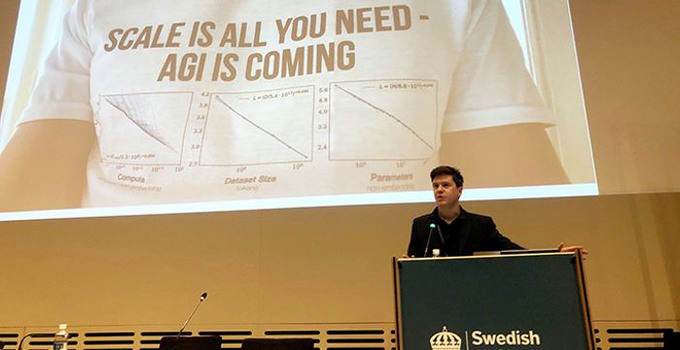
Antoine Bousquet, Associate Professor and Senior Lecturer in Political Science at the Swedish Defence University. Photo: Kjell Engelbrekt.
"I got new ideas"
Lukas Milevski, assistant lecturer at Leiden University in the Netherlands, gave a presentation on methods for studying military strategy. He attended the conference for the 14th time.
"It's nice to meet friends again. It's also a good opportunity to connect with the practical aspects of a subject. There are officers here, but also representatives from academia," said Lukas Milevski.
Aleksandra Gulasaryan, postdoctoral fellow at King's College London, appreciated the breadth of topics and that each speaker had to present their topic briefly before discussions ensued.
"It was so efficient. And it brought people together, encouraged us to collaborate. Sometimes working in academia can be isolating."
The conference provided a relaxed environment for testing ideas, felt Aleksandra Gulasaryan, who exchanged contact information with several people.
"I got new ideas, and I have found a guest speaker. It's a very valuable outcome."
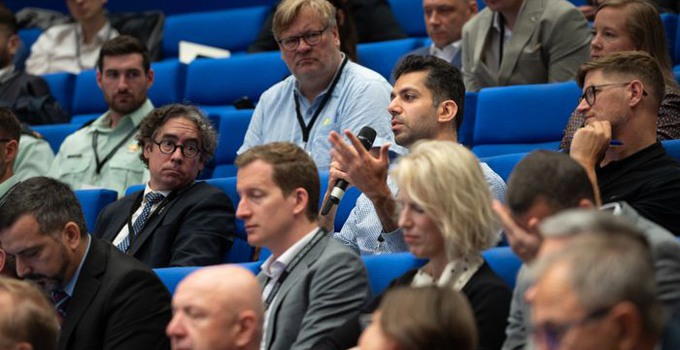
Provides networking opportunities
Kjell Engelbrekt, dean and professor of political science at the Swedish Defence University and chairman of ISMS, believes the conference achieved its goal. The purpose is to create space for networking and cross-fertilization of skills and ideas, he says.
"This is a unique meeting place for those of us who work at defence colleges, where people can meet naturally and discuss with a focus on the military dimensions. There is a natural sense of community in what we focus on," says Kjell Engelbrekt.
The members of the ISMS are small democratic countries, whose perspectives are often missing from the literature used in the teaching of the countries' defence colleges.
"A lot of the course literature we use is written and published in the USA and the UK, which downplays the defense experiences in our part of the world. This is something we can rectify here by generating texts that become publications and can then be used partly as teaching materials or as part of research projects."
Continuing to educate with quality while scaling up operations and continuously integrating fresh lessons from ongoing military conflicts is a major challenge, according to Kjell Engelbrekt.
"The question of the humanities and their place in education is another exciting theme. The versatility in all military education is something one must fight for a bit, as so much new technology is constantly being added."
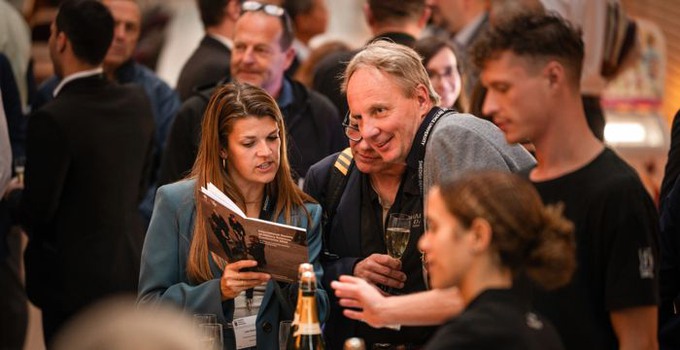
The ISMS is a collection of defence research
The International Society of Military Sciences, ISMS, is an organization created by defence colleges and their staff. ISMS was founded in 2008, with the Swedish Defence University as one of the co-founders.
The purpose is to highlight the perspectives of small democratic countries, in part to nuance the Anglo-American literature widely used in the education at defence colleges. Members of ISMS include defence colleges in the Nordic and Baltic countries, Poland, the Netherlands, Portugal, Austria, and Canada.
Each year, the chairing country organizes a conference where researchers in the field of defence meet and present their research. Individual researchers can also participate. At this year’s conference, participants came from six different continents and nearly 50 countries.
Page information
- By:
- Kommunikationsavdelningen
- Published:
- 2024-09-24
- Last updated:
- 2024-09-24
